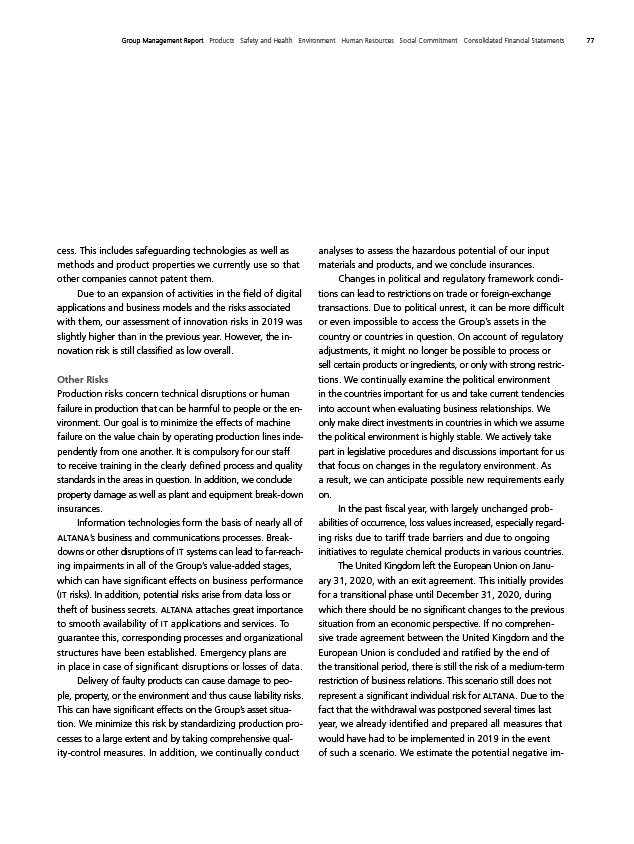
Group Management Report Products Safety and Health Environment Human Resources Social Commitment Consolidated Financial Statements 77
analyses to assess the hazardous potential of our input
materials and products, and we conclude insurances.
Changes in political and regulatory framework conditions
can lead to restrictions on trade or foreign-exchange
transactions. Due to political unrest, it can be more difficult
or even impossible to access the Group’s assets in the
country or countries in question. On account of regulatory
adjustments, it might no longer be possible to process or
sell certain products or ingredients, or only with strong restrictions.
We continually examine the political environment
in the countries important for us and take current tendencies
into account when evaluating business relationships. We
only make direct investments in countries in which we assume
the political environment is highly stable. We actively take
part in legislative procedures and discussions important for us
that focus on changes in the regulatory environment. As
a result, we can anticipate possible new requirements early
on.
In the past fiscal year, with largely unchanged probabilities
of occurrence, loss values increased, especially regarding
risks due to tariff trade barriers and due to ongoing
initiatives to regulate chemical products in various countries.
The United Kingdom left the European Union on Janu-
ary 31, 2020, with an exit agreement. This initially provides
for a transitional phase until December 31, 2020, during
which there should be no significant changes to the previous
situation from an economic perspective. If no comprehensive
trade agreement between the United Kingdom and the
European Union is concluded and ratified by the end of
the transitional period, there is still the risk of a medium-term
restriction of business relations. This scenario still does not
represent a significant individual risk for ALTANA. Due to the
fact that the withdrawal was postponed several times last
year, we already identified and prepared all measures that
would have had to be implemented in 2019 in the event
of such a scenario. We estimate the potential negative imcess.
This includes safeguarding technologies as well as
methods and product properties we currently use so that
other companies cannot patent them.
Due to an expansion of activities in the field of digital
applications and business models and the risks associated
with them, our assessment of innovation risks in 2019 was
slightly higher than in the previous year. However, the innovation
risk is still classified as low overall.
Other Risks
Production risks concern technical disruptions or human
failure in production that can be harmful to people or the environment.
Our goal is to minimize the effects of machine
failure on the value chain by operating production lines independently
from one another. It is compulsory for our staff
to receive training in the clearly defined process and quality
standards in the areas in question. In addition, we conclude
property damage as well as plant and equipment break-down
insurances.
Information technologies form the basis of nearly all of
ALTANA’s business and communications processes. Breakdowns
or other disruptions of IT systems can lead to far-reaching
impairments in all of the Group’s value-added stages,
which can have significant effects on business performance
(IT risks). In addition, potential risks arise from data loss or
theft of business secrets. ALTANA attaches great importance
to smooth availability of IT applications and services. To
guarantee this, corresponding processes and organizational
structures have been established. Emergency plans are
in place in case of significant disruptions or losses of data.
Delivery of faulty products can cause damage to peo-
ple, property, or the environment and thus cause liability risks.
This can have significant effects on the Group’s asset situation.
We minimize this risk by standardizing production processes
to a large extent and by taking comprehensive qual-
ity
control measures. In addition, we continually conduct